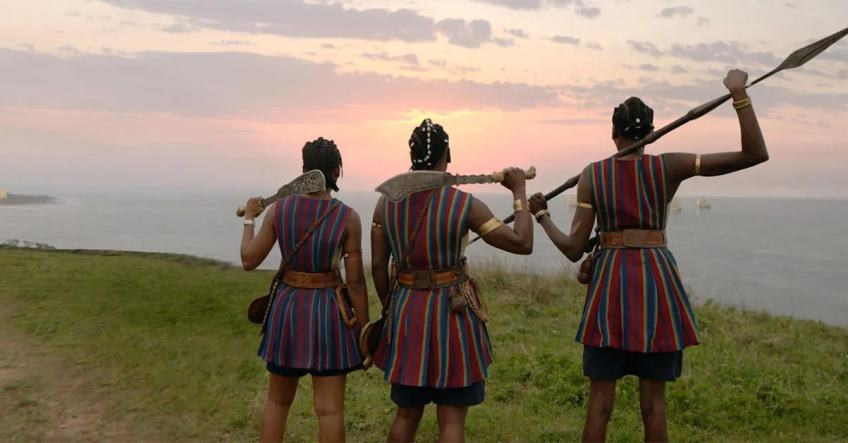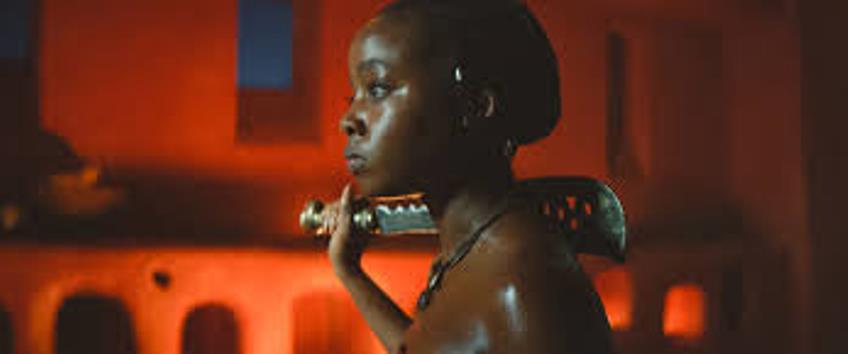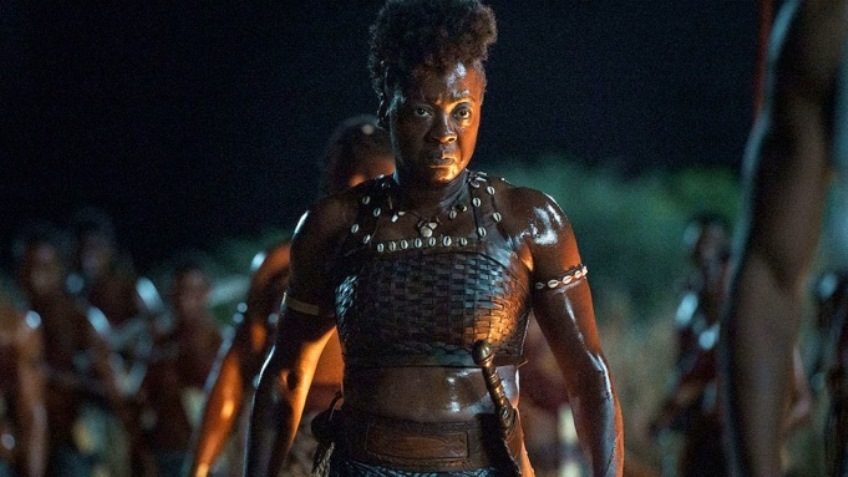Joyce Glasser reviews The Woman King (October 4, 2022) Cert 15, 134 mins.
This is not just a female-centric film, but a dark-skinned Black female centric, action- packed drama set in early 19th century Africa. It not only gives a boost to the #Me Too and Black Lives Matter movements but sends a message to ageist casting directors and studio bosses. If Tom Cruise, 60, wanted to leave his motorbikes and airplanes for a turn as Sky Masterson in Guys and Dolls studios would drool. Could an African-American female actress known for dramas like Fences and The Help or biopics like Ma Rainey’s Black Bottom convince a studio to cast her as a fierce warrior defending an historic African kingdom against slave traders?
“You’ve got to be joking” was the reaction until the crossover success of Black Panther got the money people thinking. As did the one woman who could pull it off, despite the fact she was in her fifties and was never a stunt woman or fashion model. But Viola Davis is the only African American and one of a handful of actors to win the Triple Crown: An Academy Award, a Primetime Emmy and a Tony (actually two) Award. And Davis had an unfulfilled dream of playing an action hero.
So it is that we have The Woman King which has a lot going for it. First, it is based on just enough historic truth to lend the film the credibility it needs, particularly when script writers Dana Stevens and Maria Bello impose a few credulity straining cliches into the story and Gina Prince-Bythewood is pretending to be Hilary Mantel. Second, it has a great cast and 99% percent of it are African Americans.

In 2011 Stanley Bernard Alpert’s book The Amazons of Black Sparta told the world about the Agojie, an army of female warriors in the Kingdom of Dahomey (now Southern Benin). The slave trade having reduced the number of males in the population, the kingdom is protected by a young army of women, brought up to fight.
King Ghezo (John Boyega gives him a bit of Yul Brynner’s swagger in The King and I, surrounded by his Harem) is no match for General Oba Ade (Jimmy Odukoya) the leader of the Oyo Kingdom, who support the Portuguese slave traders. He sleeps at night, however, knowing that General Mamisca (Davis) the head of the Agojie is.
The Agojie do not have sex, children, normal education or fun. Their nails are sharp weapons, and their skin is oiled to prevent the enemy from grabbing them. We watch them train until they can climb high thorny bushes without a whimper when their skin is lacerated. Because the Agojie do nothing more than train, sleep and eat, Prince-Bythewood devotes so much time to the training scenes, that they start to resemble all those movies where would be marines drag themselves through the mud and over walls while being shouted at by sadistic generals.
This tantalising basis in history aside, the draw for audiences will be the trio of battle-ready actresses beginning with Davis. Her General Mamisca is dignified, brutal, terrifying, vulnerable, fair but firm and loyal to her king, up to a point, when a dark secret divides her allegiances.
Davis has trained and it shows. The opening scene is arguably the best in the film. Warriors from the rich, neighbouring Oyo Empire, who are allied with the Portuguese slave traders, think they hear things as they sit around a campfire. They laugh off their fears only to be overcome by a group of silent Agojie on patrol. The fight choreography, attributed to Jénel Stevens, is what makes the film, and there’s plenty of it. The women fight with their swords, their knives, their nails, their hands, their legs, their quick thinking and teamwork. They aim for the head (decapitation) but will settle for anything below it.

The General has two wing women, both played by tall actresses who are convincing, particularly as Lashana Lynch has already made the grade as an MI6 agent in No Time to Die and in the Marvel Comic multiverse. Amenza, with a more spiritual nature, is played by 6ft tall Sheila Atim, whose star quality wowed London audiences in the pre-Covid sensation, Girl from the North Country where her interpretation of two Bob Dylan hits blanketed the theatres in silent awe.
There are a couple of corny subplots involving new recruit Nawi (Thuso Mbedu, 31 playing a young teenager) who refuses to be married off to an abusive older husband. As a result, the teenager, who was adopted, is left at the gates of the Agojie compound, where she will be tested and either taken in or rejected and left homeless. The Agojie are respected, but ordinary Dahomey women are not.
The first Nawi subplot is connected with General Mamisca in a way only Shakespeare would dare, and the second involves her in a romance with a Portuguese gentleman with Dahomey ancestry who came over with the slave traders. You are just waiting for him to start singing Younger than Springtime as the star crossed lovers give in to their doomed passion.
Fortunately, the filmmakers (the female-oriented cast and crew extends to cinematographer Polly Morgan) refocus on the slave trade and a chaotic action scene at the port. After several notable victories (spoiler here), Mamisca tries to convince her king to get rid of slavery as a source of revenue. There is some historic truth here, too, and Dahomey has to figure out how to find the money from slave trading elsewhere. Europe is facing a similar problem now, as we ditch the Satanic Russian oil while scrambling for alternatives.




